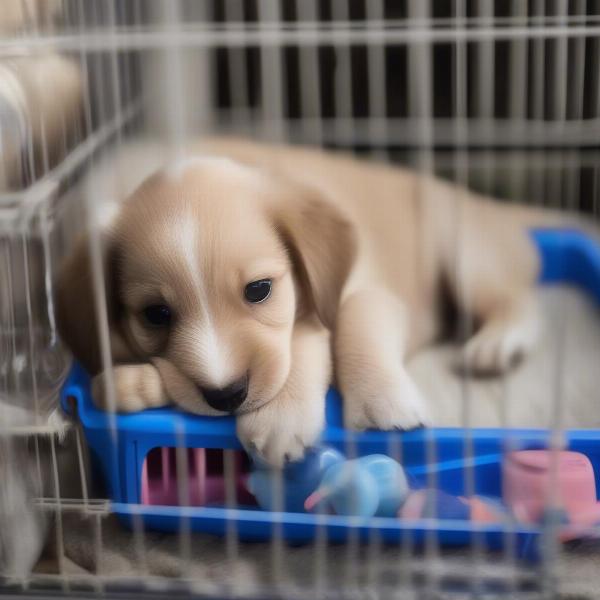Potty training, or housebreaking, can be one of the most challenging but rewarding aspects of bringing a new puppy home. While the term “pot names for dogs” might seem amusing, it highlights the importance of consistent communication during this crucial training phase. This guide will explore the various approaches to potty training, offer practical advice for success, and debunk common myths. We’ll help you understand your puppy’s needs and develop a personalized strategy to make the housebreaking process as smooth as possible.
Understanding Your Puppy’s Potty Needs
Every puppy is an individual, and their potty training journey will be unique. Factors like age, breed, and previous experiences all play a role. Generally, younger puppies need to eliminate more frequently due to their smaller bladder size. Understanding these basic needs is the first step towards successful potty training.
Frequency of Elimination
Puppies typically need to go potty after waking up, after eating or drinking, and after periods of play. As a rule of thumb, a puppy can hold their bladder for about one hour for every month of age. So, a two-month-old puppy might need a potty break every two hours.
Recognizing the Signs
Learning to recognize your puppy’s potty signals is essential. These can include restlessness, circling, sniffing the ground, whining, and squatting. The quicker you respond to these cues, the more effectively you can prevent accidents.
Creating a Potty Training Routine
Consistency is key when potty training a puppy. Establishing a predictable routine will help your puppy learn what’s expected of them.
Scheduled Potty Breaks
Take your puppy outside to their designated potty area at regular intervals throughout the day, especially first thing in the morning, last thing at night, and after meals and naps.
Positive Reinforcement
Reward your puppy immediately after they eliminate outside with praise, treats, or a favorite toy. This positive association helps reinforce the desired behavior.
Crate Training
Using a crate can be a helpful tool in potty training. Dogs instinctively avoid soiling their den, so a properly sized crate can encourage them to hold it until their next potty break.
 Puppy in a crate during potty training
Puppy in a crate during potty training
Dealing with Accidents
Accidents are inevitable during potty training. It’s crucial to handle them calmly and effectively.
Cleaning Up Accidents
Clean accidents thoroughly with an enzymatic cleaner to eliminate odors and discourage repeat offenses. Avoid using ammonia-based cleaners, as the smell can resemble urine and confuse your puppy.
Avoid Punishment
Punishing your puppy for accidents is counterproductive and can create fear and anxiety. Instead, focus on positive reinforcement and consistent training.
“Remember, patience and consistency are essential during potty training,” advises Dr. Emily Carter, a certified veterinary behaviorist. “Focus on rewarding the desired behavior, and your puppy will learn in time.”
Troubleshooting Common Potty Training Issues
If you’re encountering challenges with potty training, don’t get discouraged. Here are some common issues and solutions.
Regression
Sometimes, puppies who seem fully house-trained might suddenly start having accidents again. This could be due to stress, changes in routine, or medical issues. Consult your veterinarian to rule out any underlying health problems.
Submissive Urination
Some puppies urinate when they greet people or are being petted. This is often a sign of submission or excitement, not a potty training issue. Consult a professional dog trainer for guidance on addressing submissive urination.
Conclusion
Potty training is a journey, not a destination. With patience, consistency, and positive reinforcement, you can successfully housebreak your puppy and enjoy a clean and happy home. Remember to focus on understanding your puppy’s individual needs and adapt your approach accordingly. “Potty training takes time and effort, but the reward of a well-behaved, house-trained companion is worth it,” adds Dr. Carter.
FAQ
-
How long does it usually take to potty train a puppy? Potty training can take anywhere from a few weeks to several months, depending on the individual puppy.
-
What should I do if my puppy has an accident in the house? Clean the area thoroughly with an enzymatic cleaner and avoid punishing your puppy.
-
How often should I take my puppy outside for potty breaks? Take your puppy out regularly, especially after waking up, eating, drinking, and playing.
-
Is it okay to use puppy pads? While puppy pads can be helpful in certain situations, they can sometimes prolong the potty training process.
-
When should I start potty training my puppy? Start potty training as soon as you bring your puppy home.
-
What should I do if my puppy refuses to eliminate outside? Try changing the location or time of day for potty breaks.
-
Should I scold my puppy for accidents? No, scolding can make your puppy fearful and hinder the training process.
About ILM Dog
ILM Dog is your trusted international resource for all things dog-related. We offer expert advice and practical tips on dog breeds, health, training, nutrition, grooming, and much more. From puppyhood to senior care, we’re dedicated to helping you provide the best possible care for your canine companion. Whether you’re looking for advice on choosing the right breed or need help with behavioral issues, our team of experts is here to guide you. Contact us at [email protected] or +44 20-3965-8624.